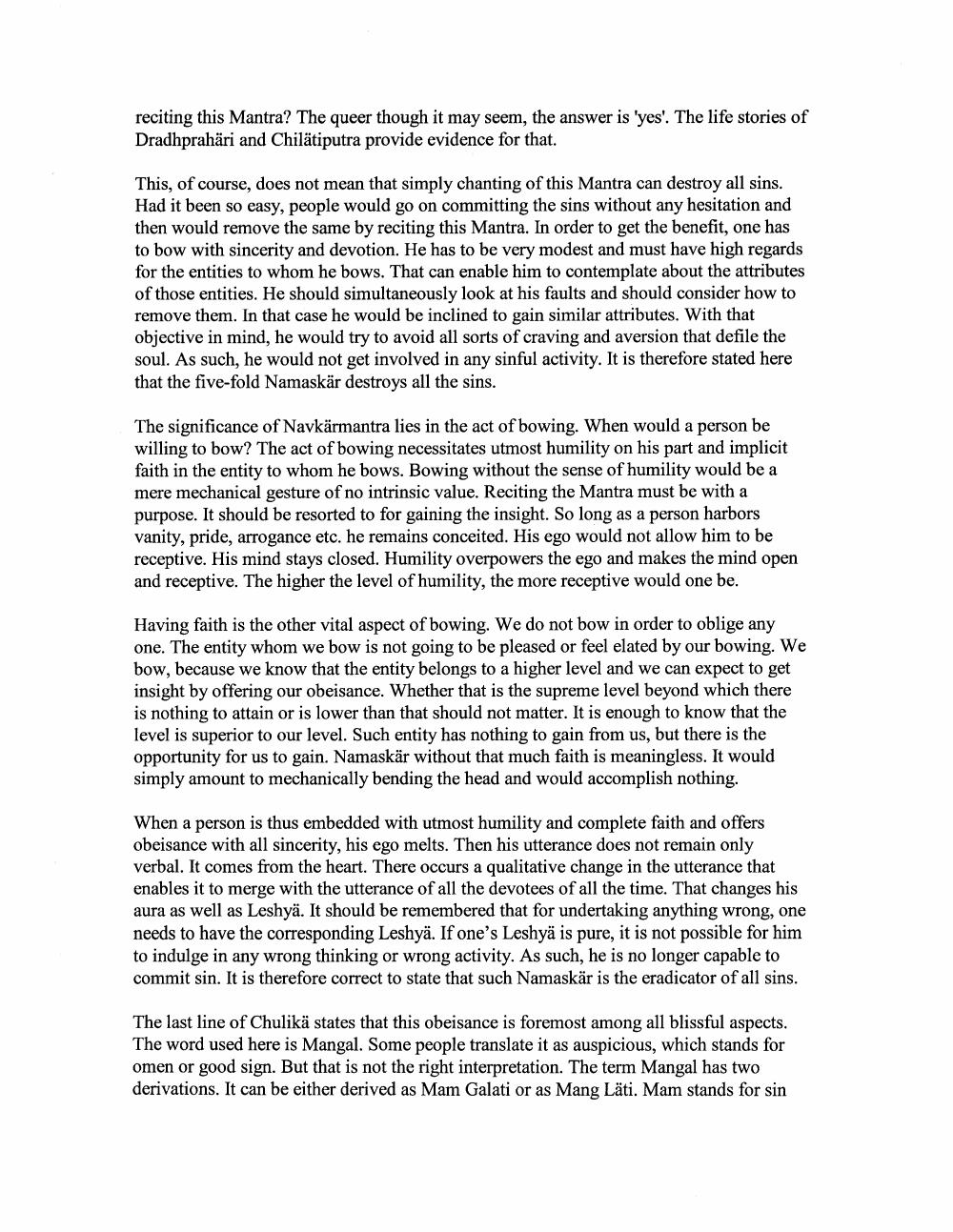Book Title: Samayik And Chaityavandan Vidhi Author(s): Manu Doshi Publisher: Manu Doshi View full book textPage 8
________________ reciting this Mantra? The queer though it may seem, the answer is 'yes'. The life stories of Dradhprahari and Chilätiputra provide evidence for that. This, of course, does not mean that simply chanting of this Mantra can destroy all sins. Had it been so easy, people would go on committing the sins without any hesitation and then would remove the same by reciting this Mantra. In order to get the benefit, one has to bow with sincerity and devotion. He has to be very modest and must have high regards for the entities to whom he bows. That can enable him to contemplate about the attributes of those entities. He should simultaneously look at his faults and should consider how to remove them. In that case he would be inclined to gain similar attributes. With that objective in mind, he would try to avoid all sorts of craving and aversion that defile the soul. As such, he would not get involved in any sinful activity. It is therefore stated here that the five-fold Namaskär destroys all the sins. The significance of Navkarmantra lies in the act of bowing. When would a person be willing to bow? The act of bowing necessitates utmost humility on his part and implicit faith in the entity to whom he bows. Bowing without the sense of humility would be a mere mechanical gesture of no intrinsic value. Reciting the Mantra must be with a purpose. It should be resorted to for gaining the insight. So long as a person harbors vanity, pride, arrogance etc. he remains conceited. His ego would not allow him to be receptive. His mind stays closed. Humility overpowers the ego and makes the mind open and receptive. The higher the level of humility, the more receptive would one be. Having faith is the other vital aspect of bowing. We do not bow in order to oblige any one. The entity whom we bow is not going to be pleased or feel elated by our bowing. We bow, because we know that the entity belongs to a higher level and we can expect to get insight by offering our obeisance. Whether that is the supreme level beyond which there is nothing to attain or is lower than that should not matter. It is enough to know that the level is superior to our level. Such entity has nothing to gain from us, but there is the opportunity for us to gain. Namaskär without that much faith is meaningless. It would simply amount to mechanically bending the head and would accomplish nothing. When a person is thus embedded with utmost humility and complete faith and offers obeisance with all sincerity, his ego melts. Then his utterance does not remain only verbal. It comes from the heart. There occurs a qualitative change in the utterance that enables it to merge with the utterance of all the devotees of all the time. That changes his aura as well as Leshyä. It should be remembered that for undertaking anything wrong, one needs to have the corresponding Leshyä. If one's Leshyä is pure, it is not possible for him to indulge in any wrong thinking or wrong activity. As such, he is no longer capable to commit sin. It is therefore correct to state that such Namaskär is the eradicator of all sins. The last line of Chulikä states that this obeisance is foremost among all blissful aspects. The word used here is Mangal. Some people translate it as auspicious, which stands for omen or good sign. But that is not the right interpretation. The term Mangal has two derivations. It can be either derived as Mam Galati or as Mang Läti. Mam stands for sinPage Navigation
1 ... 6 7 8 9 10 11 12 13 14 15 16 17 18 19 20 21 22 23 24 25 26 27 28 29 30 31 32 33 34 35 36 37 38 39 40 41 42 43 44 45 46 47 48 49 50 51 52 53 54 55 56 57 58 59 60 61 62 63 64 65 66 67 68 69 70 71 72 73 74 75 76
